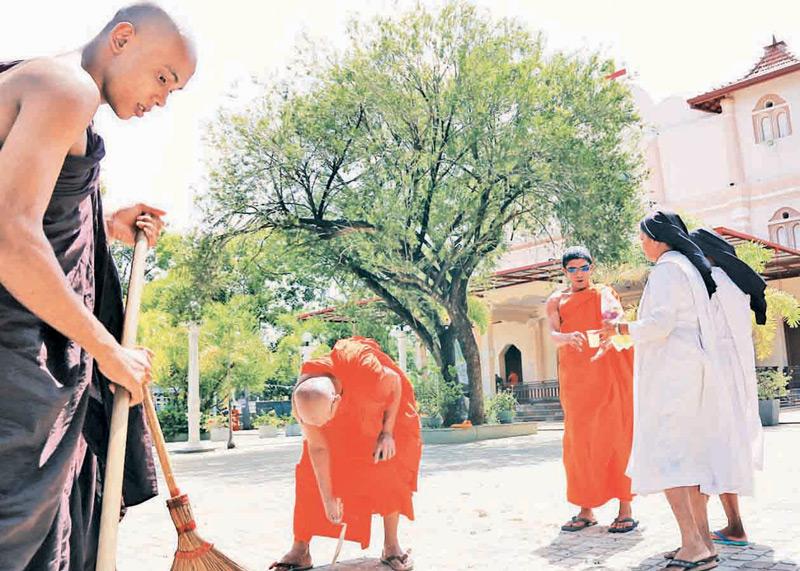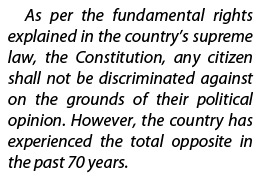
As the country faces another Presidential Poll amidst political chaos and sinister factions working to exacerbate religious and ethnic divisions; was it fate, or a higher power that moved the hand that set the poll date on November 16, which also happens to be the International Day of Tolerance? How tolerant are we as a nation? How important for the next President from whichever party he or she is to uphold tolerance in the effort of nation building and paving way for development? The Sunday Observer explores.
 It would have been pertinent if we were to hold the Presidential elections on September 15, which is International Day for Democracy.
It would have been pertinent if we were to hold the Presidential elections on September 15, which is International Day for Democracy.
A few weeks before announcing the date of the 2019 Presidential polls, Chairman of the Election Commission Mahinda Deshapriya told media the above, at a press conference.
However, knowingly or not, the Election Commission had chosen a day which is equally important to hold the election, United Nations (UN) declared, International Day for Tolerance.
International Day for Tolerance is a day globally celebrated on November 16, since 1995, to generate public awareness of the danger of intolerance. The General Assembly of the UN passed its resolution 51/95 which introduced the declaration of principles on tolerance.
“Tolerance is respect, acceptance and appreciation of the rich diversity of our world’s cultures, our forms of expression and ways of being human.” - UNESCO’s 1995 Declaration of Principles on Tolerance.
Tolerance is not natural?
Embracing the natural diversity among human kind and promoting unity among different communities could be the simplest definition of tolerance. Being a multi-ethnic society rather than a Sinhalese-Buddhist country, Sri Lanka has been home to various communities since ancient times. According to government statistics, there are about 25 ethnicities scattered through the island. In such a context, a real appreciation of tolerance would be the only path to an actual celebration of democracy.
“One must understand that the concept of tolerance is not a natural state for humans. It is an attitude and virtue which needs to be cultivated” Immediate Past President of the Sri Lanka Medical Association Dr Ruvaiz Haniffa highlights.
In a brief interview with the Sunday Observer, he stressed the importance of marking the upcoming Presidential election as an opportunity to create a society with tolerance.
“We are now experiencing intolerance among ethnic groups and communities growing exponentially by the hour because of the Easter Sunday carnage. W e need to use this backdrop to convince all Presidential hopefuls to pledge to create an environment and mechanism to foster tolerance in Sri Lanka” he said.
In the recent past, the country has experienced hate and sinful political opinions in national level politics. It brings disgust to the moderate public, seeing the way such ethnic tensions is spread by national level politicians while they enjoy immunity for such crimes.
Dr Haniffa added, “Elections have the potential to increase political and ethnic intolerance which could lead to ethnic-political violence.
This would be a further justification to ask the Presidential Candidates about their specific plans to deal with such a situation and get a public commitment from them to stamp out intolerance through declaring 2020 as a year of tolerance”.
The Easter Sunday carnage
The Easter Sunday bombings in Sri Lanka, which brought death to more than 250 civilians and saw 500 plus injured, could drag the ethnic tensions in the island into a new dimension.
However, possible clashes among ethnicities were reversed by the leadership of His Eminence ,Malcom Cardinal Ranjith.
“We are in the phase of rapidly fading memories of the 2019 Easter Sunday carnage which was planned, organised and carried out by a group of misguided Sri Lankan Muslims.We as a community are being collectively punished for the actions of a few extremist terrorists who were either guided or misguided by a still existing group of fundamentalist Sri Lankan Islamic clergymen” Dr Haniffa said.
After the Easter Sunday attack, expression of ideas, concerns and expectations of the majority Sinhalese community with regards to the SriLankan Muslim minority is now more open and transparent says Dr Haniffa. “Hence, I personally see this as an opportunity to address the issue of suspicion and anger towards minorities in general andthe Muslim community in particular” he suggests.
Achieving tolerance
Prominent political scientist, Prof. Jayadeva Uyangoda says that the notion of tolerance has deep roots which date back to ancient Greek civilisation and the classical era of the Indian sub-continent too.
“The notion of tolerance has a very long history. It goes back to the Greek period in Europe and classical India, in particular Buddhism and Jainism advocated tolerance” he commented.
According to his views, liberal philosophy in the 17 century is also one of the philosophical traditions which promoted tolerance. At the same time he points out major similarities between the conceptual history of the idea of tolerance in both classical Greek philosophy and classical Indian philosophy. “It is the notion that fallibility is a characteristic of the human kind. So, I cannot impose my views on another as my views can be disputed. Actually that is the philosophical origin of tolerance. For instance, Buddha never said that he discovered the ultimate truth. People may have later interpreted that Buddha had said so” the Professor explained.
As per his reading of the history of human civilisation, even religions which earlier advocated tolerance later had been used for political purposes. These new traditions interpreted the religion in a more sectarian, dogmatic way, he says.
“Then the idea of tolerance disappeared. If you look at Christian-Buddhist debates in Sri Lanka, you would see that kind of epistemic disputation. That is why the revival of the idea tolerance is important” Prof. Uyangoda said.
However, he thinks that the world has an opportunity of creating a tolerant society. While Sri Lankan society features certain undemocratic practices such as caste based discrimination, tolerance is a real test ahead us and it should be our goal.
“Tolerance is an achievable normative goal. Because in an absence of something such normative goals are set. For an instance democracy emerges in the absence of democracy. Similarly tolerance emerges in the absence of tolerance” he opined.
Tolerance in politics
As per the fundamental rights explained in the country’s supreme law, the Constitution, any citizen shall not be discriminated against on the grounds of their political opinion. However, the country has experienced the total opposite in the past 70 years.
In this setting, a prominent Civil Activist in the North, Eng. M. Sooriyasegaram says that promoting tolerance during elections is also important.
“There is a big competition among everybody to get their party candidate elected. Therefore, violence and intolerance has become quite a common occurrence in elections. In my experience elections in Sri Lanka were more democratic in ‘50s and ‘60s than today. We had a very advanced form of democracy in those days. But after 1977 Sri Lanka has being sliding downwards” he said.
At the same time Sooriyasegaram wonders about the increase of intolerance in a country where the majority are Buddhists. He said, “Buddha is a symbol of peace and tolerance. But today, the religion got involved in politics and politics got involved in religion. Therefore, Buddhist clergy who have to be sort of a source of tolerance, engage in mob activities today”.
